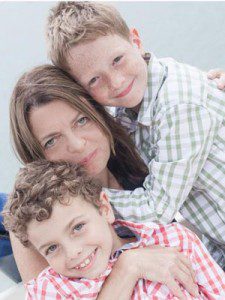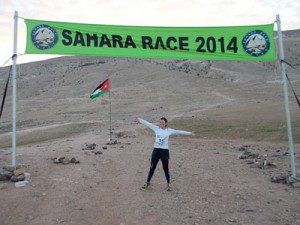Janine Canham is Chief Operating Officer for Sanford C. Bernstein, a global financial research / broker-dealer company, with responsibility for their Asia Pacific region, based in their Hong Kong Office. In addition to the regular responsibilities for her role, Janine heads up the firm’s women’s initiative. She is a busy working mother of twin boys. In her spare time, Janine is a keen runner, having recently completed the 250km multi-stage Sahara Race.

“…I don’t think it’s possible for anyone to ‘have it all’. It’s hard work and we can have a meaningful career, be good parents and also pursue our own interests – it doesn’t have to be a choice between one or the other…”
Please tell us about your career to date
I worked as a corporate lawyer for over 20 years, becoming an international partner in a global law firm before moving into the financial sector. At Sanford C. Bernstein my role is to oversee support functions, including Legal,
Compliance and day-to-day operations, as well as being on the Asia Operating Committee, which makes strategic decisions about the business. I started my career at Slaughter and May in London, but I have been working in Hong Kong for over 20 years.
Corporate hours are long. How do you maintain a sense of work life balance?
I’m not sure I would use the word “balance”! It’s a constant juggling act, but I have very supportive managers and colleagues who have families and interests of their own and understand the importance of having a life outside the office. I am in the office by 7.30am and leave around 3 to 4pm most days, which gives me a lot of flexibility to spend time with my children.
It’s impossible as a COO in a global firm to simply switch off – I am always on my Blackberry and have calls with our London and New York offices in evenings. I fit in my training for my runs around work and my children. So I train several times a week in the evening after my boys have gone to bed and I run at the weekend when they have activities. It’s very important to set aside time for these things, so I block certain time slots in my diary.

How do you reconcile the role of a parent with the challenges of corporate life in an increasingly global world?
You need to prioritise and to fit work around the children to the extent you can. Communication is so easy these days – I can take conference calls from home after my boys are in bed, I can respond to emails while they do their homework – but I make sure I am home in the afternoon at the same time as they come home from school.
My working hours are stretched out longer, and ‘flexi hours’ for me does not mean shorter hours! But it does allow me to spend valuable time with my children. It also helps that I have a husband who is very hands-on with our boys and who can spend a lot of time at home with them as well.
What would you say to women who feel pressure to ‘have it all’?
Don’t! We put ourselves under a lot of pressure. I don’t think it’s possible for anyone to ‘have it all’. It’s hard work and we can have a meaningful career, be good parents and also pursue our own interests – it doesn’t have to be a choice between one or the other, but we have to accept certain limitations, as there are only so many hours in the day. It’s also really important to have a network of friends who are in the same boat as you, and my girlfriends are a huge support system.
How can employers support women better in order to develop and retain talent?
Offer flexible hours, so women can spend important time with their children. The reality is that the majority of women will not cut corners; they will still work really hard to get the job done. Many of my female friends work so-called ‘part time’ or ‘flexi hours’ for less salary, but work just as hard as they did before. We are just efficient and focused and get on with it, and employers who acknowledge that will retain their top female talent.
You were recently asked to lead the women’s initiative for your firm’s Asia Pacific region. Please can you tell us about this?
Our company believes in diversity and really wants to help empower women (as well as other minorities) to progress in their careers. We’re working on building confidence in our employees to feel they can manage the direction of their career and know that they have a choice.
What events and activities do you have planned?
We held a kickboxing class to literally kick start our initiative! We also recently held a workshop at which we explored how men and women approach certain things differently at work and what it is that might be holding women back and how we can work together to remove those barriers.
How supportive are your male colleagues?
Very! We’re really fortunate to have some great guys in the office who really get it, and who are very approachable and easy to talk to. We have a lot of talented women at Bernstein and everyone is very open to suggestions on how to retain them and keep attracting them. I would not want to be leading our initiative in Asia if I felt the men were not genuinely behind it.
You recently returned from running a ‘super marathon’ across the Sahara desert. Please tell us more…
I took part in Racing the Planet’s Gobi desert race last June and in the Sahara (Jordan) race in February. Both races followed the same format. You run one marathon a day for four days, then on the fifth day you run a double marathon. The event is self-supporting, meaning that you have to carry all your own gear for the week (sleeping bag, freeze dried food, clothes, safety equipment, medical kit etc.) which weighs in at around 10kgs. Basic tents are provided for you to sleep in, and water rations – you have to carry everything else.
It’s incredibly liberating to know you have everything you need for the week on your back and to have no access to phones or emails. It really forces you to live for the moment. The course in Jordan was absolutely beautiful: Soft pink sand and golden hued canyons across the same terrain which Lawrence of Arabia crossed in World War One.
How do you prepare for something like that?
You need to build up long distance running, and train with weight on your back. I was running with a sack of rice and diving weights in my backpack! You also need to build your core muscles, so it helps to cross train. You need to be organised and spend time researching equipment so that you can manage the volume and weight in your rucksack. My husband is also extremely supportive of my love of running, which helps a great deal as I prepare.
It sounds like a test of physical and emotional stamina. What was the hardest part?
The hardest part for me was lugging around 10kgs on my back for so many hours, particularly in soft sand. That’s 20% of my body weight and it really slows you down and feels pretty uncomfortable. However, it’s amazing what your body and mind are capable of achieving when you push to find your limits.

How does this stamina help you in your corporate life?
It makes you more resilient and determined and pushes you outside your comfort zone. I don’t like giving up, so I will always look at different ways to achieve an end goal – giving up is my last resort. These long distance races are also a reminder of how strong women can be.
Whilst many men in the race might be much faster than us, women often do well because they approach it differently. Women keep in mind the end goal and we strategize, listen to our bodies, manage our pain and think ahead. This means you will find yourself eventually overtaking some of the fitter guys at the later stages who might have started out too fast, not held back enough in the tank or injured themselves. You often find this mirrored in the workplace. For instance, women sometimes hold back in negotiations because winning every point may not be as important as the end goal or as building a positive team environment.
You’ve supported a number of charities in recent years. Please tell us about the personal significance of the charity you chose for your latest race.
I chose to run the Sahara race to raise funds for War Child, which is a small charity whose aim is to help innocent children rebuild their lives which have been torn apart by war. It seemed appropriate since the race took place in Jordan, which is home to millions of refugees. I am half Lebanese and was brought up in Beirut, so the plight of innocent children who have no idea what is going on around them, strikes a chord.
So, what sporting challenges lie ahead..?
My next ‘big’ race is a 100k ultra in Mongolia in July. I really look forward to these events, not just the challenge but the amazing scenery and the incredible people you get to meet. My advice to anyone contemplating such a challenge is Just Do It. You will always regret it if you don’t.
To donate to War Child, click here: http://www.justgiving.com/Janine-Canham
Click here to read Janine’s last racing blog: http://www.4deserts.com/blogs/sr_comptetior_blog.php?pid=MjI0OA==&blog=126





